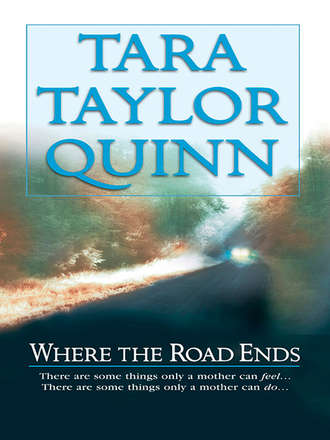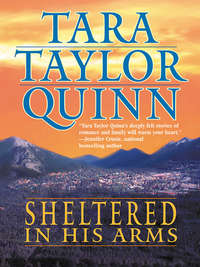
Полная версия
Where the Road Ends
She’d lost it twice that day and each time had found it again within minutes. The Fates were with her now.
And maybe Johnny was, too. In the past months, Amy had felt an odd closeness to the husband she’d lost. Odd because, in some ways, she felt closer to Johnny after his death than she had during the last few years of their marriage. As though he was watching over her.
In those last years, the one thing that had bound them together was Charles. No wonder she felt his presence, his support, as she dedicated every ounce of energy to finding their son and returning him safely home.
And Johnny had warned her about Kathy. He’d understand why she’d undertaken this search, which others considered a complete dead end.
He’d also understand that she couldn’t just sit at home, waiting for the professionals to do their jobs. He’d share her uncompromising need to be out here on the road.
What would her little boy be wearing? He’d always preferred denim. And baseball jerseys. But of course Kathy knew that…if Kathy was the abductor, as Amy firmly believed.
Did Charles have a winter coat?
She should call Brad Dorchester. Let him know she was so close. She was paying the private investigator an exorbitant amount of money for a reason. She’d hired him—a Denver resident—over the perfectly competent detectives in Chicago because he was reputed to be the best in the country.
And she’d promised to keep him informed of her whereabouts.
While the renowned P.I. did not approve of Amy’s active participation in the hunt for her son—especially as she was working independently of the official search, driven by her own instincts—he was seriously engaged in keeping track of her and her progress.
And he followed up on every hint, every lead, she might find.
Eyeing her cell phone in the console, she continued to drive.
Dorchester, an ex-FBI agent, and the FBI, along with various local police forces, had been working around the clock for months. In the beginning, they’d received about a call a minute from people reporting sightings. None of them had turned out to be accurate, but they’d had to check them all.
The past five months, they’d investigated Wainscoat business associates, both in the company and outside it, gardeners, repairmen, even her mailman. They’d talked to every single employee of the amusement park, but no one remembered seeing anything unusual. Some had remembered Charles, but no one had noticed him with anyone in particular.
The Chicago police had even had her and Cara, Celeste and Clifford Smith, the chauffeur and a few other key people take lie-detector tests. To no avail.
Kathy had been among those tested; she’d been questioned repeatedly. The police had concluded she wasn’t guilty—and then she’d vanished without a trace. Until recently, when there’d been sightings in or near various Michigan towns.
Charles’s picture had been everywhere. On television, posted around the country at police stations, schools, churches. Even in the tabloids.
She’d given them the picture of Charles that had been taken at his fifth birthday party, less than two weeks before his disappearance. The pitcher for the Chicago White Sox had been there. In the photo he’d been ruffling Charles’s hair.
And what about that hair, dark and thick like hers? She and Johnny had kept their son’s hair just long enough to be untraditional. Had his abductor cut it short?
Another bend in the road.
Still no green sedan.
The town was just ahead. Instead of billboards, she could see buildings. The green sedan might be just around that curve. Amy pressed the gas a little harder.
Where would she and her son stay that evening? Grand Rapids, maybe? Or Kalamazoo? Someplace far from the dusty little towns she assumed Charles had been dragged through all through the fall and into the winter. Someplace where she could get them a penthouse suite and they could order room service and play video games until her little boy fell asleep at the controls and she could pull him onto her lap and never let him go.
Another curve. No car.
Hands trembling, Amy wondered what she’d do if she didn’t find him that night.
How could she possibly take this for another day? Or week. Or month.
An insidious burning crawled through the lining of her stomach, settling just beneath her rib cage. Hands clenched around the steering wheel, shoulders hunched in her parka, she admonished herself to stay focused. On the road. On what mattered. She wasn’t going to allow doubts. Wasn’t going to get discouraged. Charles needed her.
And she needed him, too.
This was the day. The town. She could feel it. She’d never been this close. Never had a lead that lasted longer than the minutes it took to check it out.
Wiping the sweat from her upper lip, she slowed as she approached the town. One motel, a diner, some shops, scattered homes—nothing as formal as a neighborhood—a school that looked a little shabby… Occasional piles of dirty, melting snow.
And a green Grand Am. It turned the corner in front of her.
Thank God.
Giddy with renewed confidence, Amy ignored the twenty-five-mile-an-hour speed limit, ignored the grumbling in her stomach, pressed her foot to the floor—and caught the glimpse of taillights as the green car turned again. And then again. It was winding over roads that looked as if they’d been forgotten in the previous century. Cracked, graying pavement. Potholes. No sign of human life on either side.
Kathy Stead—the brunette driving that car had to be Kathy—was traveling away from the county road that led out of town. And turning without hesitation, as though she knew where she was going. But Amy couldn’t remember the nanny ever mentioning the town of Lawrence.
There were no taillights at the next turn. Head snapping from left to right, Amy peered intently. The car had to be up there; she just wasn’t seeing it. Had it turned into a drive? Or a street that she’d missed?
Fighting the nausea that would only slow her down, she drove the stretch of road twice more, slowing at every slight break in the overgrown brush. Cars didn’t simply disappear into thin air.
Five-year-old boys, yes, that happened, but not three-thousand-pound cars.
Still, there was no sign of it.
A huge, wrenching sob filled the Thunderbird. She’d never heard herself make such a sound until the night Johnny died. It didn’t surprise her anymore. Mostly she just gave in to it. Let it twist her ribs painfully, ripping her throat as it exploded out of her. Sometimes she hurt so badly she couldn’t help herself.
All day she’d been chasing this car. Daring, after so many months of emotional torment, to hold on to some minuscule thread of hope. And now the car had been out of her sight for longer than it’d been since she’d first spotted it coming out of the motel drive early that afternoon.
Yesterday she’d been in Flint, showing around a picture of her ex-nanny. The cashier in a gas-station food mart had recognized Kathy, said she’d been in the evening before. She thought Kathy had said she was staying at the motel down the street.
Damning the dusk that was falling in spite of every effort she’d made to outrun it, Amy choked back more tears.
Please. Please don’t let me lose him again, she silently begged.
Back at the intersection where she’d last seen the sedan, Amy turned abruptly and sent gravel flying.
She pictured Charles as he’d been that day at Six Flags, prancing along beside her. His sweet eyes had shone with joy behind those dark frames.
She wasn’t going to fail. She couldn’t.
She retraced her path again. And again.
Nothing.
And then she took every side road, private drive and turnoff that bisected the forsaken stretch of old blacktop.
An hour later found her once more at the main road, staring out into the blackness that was a perfect cover for secrets. Was Charles out there in the darkness? Crying for her?
Was the world making any sense at all to the small son she and Johnny had tried so hard to protect?
“No!” Amy cried aloud, slamming the palm of her hand on her steering wheel. “No! No! No…”
Cotton pants sweaty and wrinkled, her face stiff with tears and a day’s worth of highway grime, Amelia Wainscoat, CEO and principal stockholder of a nationally famous billion-dollar construction firm, wearily slid the big metal key into the lock on the motel room’s discolored door.
She didn’t have to stay in Lawrence. Could have gone on to Grand Rapids or Kalamazoo, supplied herself with the comforts and amenities of a five-star hotel, but she hadn’t been able to make herself leave this nondescript town—not while there was still a chance that her son was here.
She’d barely dropped her leather bag on the bed before she was stripping down on her way to a bathroom that would only be passable at best, to stand in a skinny and cracked tub the likes of which, until nine months ago, she’d only seen in movies.
There were no bugs. That was good enough for her.
Careful not to let the suspiciously stained plastic curtain touch her more than she could help, Amy stepped into the tub. The towel provided for her use—a threadbare piece of terry cloth barely big enough to cover her shoulders—was hanging in close proximity. And the complimentary shampoo was a brand she’d at least heard of.
It was her lucky day.
Or so she tried to convince herself until she turned on the shower—and discovered that calling it a shower was far too generous. And no matter how far to the left she twisted the faucet handle, the temperature was tepid at best.
Amy burst into tears. She cried until her head ached. Her hair, cut straight and just to her shoulders, hung wet and limp around her face.
Maybe she was going crazy. What on earth was she, Amelia Wainscoat, only child of the once-prominent, now-deceased William George Wainscoat, doing in a tiny depressed town, standing in a shower with who knew what growing in the drain at her feet? And all because she’d seen a car that had looked like Kathy Stead’s. And a woman driving it who—judging by the glimpses she’d had—could have been her former nanny.
“But what else can I do?” She asked the question aloud, no longer uncomfortable with hearing her own voice. She wasn’t sure when, during the past months, the habit of talking to herself had started.
“You’re losing it, Wainscoat, if you really believed you were going to be holding your baby tonight.” There’d been no sign of a child in that green sedan.
“Why do you do this to yourself?”
Of course, Charles had always slept in the car. He could have been lying down, either in the seat beside Kathy or on the back seat—depending on how much he’d grown, how much space he’d need for legs that weren’t going to be as short and stout as she remembered them.
She hoped he’d been strapped in.
If Kathy wanted Charles badly enough to have kidnapped him, surely she’d be seeing to his safety.
Johnny had warned her about Kathy that day in her office, but even he had been certain that Charles was not in any physical danger. Of course, that had been before last year, before Kathy had become almost insanely possessive.
Amy had to struggle not to lean against the mildewed tile wall beside her. To lean, and slide right down with the minimal stream of water to the dirty tub and then slowly down the drain.
2
“Brad Dorchester.”
It was almost ten o’clock at night. Didn’t the man ever go off duty and just say hello? “It’s Amy.”
“I’ve been expecting your call.”
“Why?” They’d had no specific arrangement.
“Because it’s been three days.”
Dressed in the white flannel pajamas she’d bought the previous week, Amy methodically arranged the pillows against the nailed-down headboard and dropped to the mattress, clutching her cell phone.
“Do you have any news?” she asked.
“Nothing significant. I’d have called if I did.”
She nodded. Brad was very good at keeping her informed.
Forcing the desperate, grieving woman deep inside, Amy escaped into the nonchalant manner she’d developed somewhere between Kenosha and La Crosse, Wisconsin, the previous fall.
“I think I found Kathy today.”
There was a pause on the other end of the line. She shouldn’t have bothered calling. She knew that Brad agreed with the police. They’d run a thorough investigation on Kathy, on her bank account, her habits, her home. Questioned her intensively. Administered two lie-detector tests. Watched her carefully. After which they’d absolved her of any suspicion of wrongdoing. That was the reason Amy was out on the road; she still suspected that Kathy had taken Charles. She believed the nanny was guilty because nothing else made sense. There’d been no ransom demands, no communiqués, no threats.
And if she didn’t look for Kathy, no one would, considering the official verdict that the nanny wasn’t involved.
She wouldn’t have called except that she wanted Brad armed with every possible piece of information, no matter how small, insignificant, inconsequential or unnecessary it might be. Regardless of what Brad believed about Kathy, Amy had all her hopes wrapped up in him.
If anyone could put seemingly random pieces together, it was Brad Dorchester. He wouldn’t be working for her otherwise.
“You’re out on the road again.” His no-nonsense tone was resigned, disapproving.
“Of course.”
“When did you leave Chicago?”
“Two days ago.”
“You were only home twenty-four hours this time.”
“I can’t just sit there and wait. You have no idea the toll it takes on me.”
“Traveling incognito from town to town is taking its toll, Amelia.”
“He’s got to be going to school somewhere, or having his teeth cleaned, visiting a doctor, playing a video game or eating a fast-food hamburger. Someplace, someone’s going to have seen him.”
“Every law officer in that part of the country is looking for those leads.”
“The abductors know that. They’ll be on guard. But they won’t be guarding against an unremarkable woman who’s just moving to town. There’s nothing threatening about that. And townspeople talk. All I have to do is be in the right place at the right time, get to know the right person, and I’m going to find my son.”
“Or make yourself ill.”
She wasn’t paying him to look out for her health. “I know it was Kathy I was following today.”
“Kathy was cleared of any suspicion months ago.”
“And afterward she buys a new car and leaves town.”
“Wouldn’t you have needed a new life after all that publicity? Being questioned in connection with kidnapping a child is a little hard on the reputation. Especially in her line of work.”
“She was unbalanced and had a motive.”
Charles had disappeared less then two weeks after Amy had let Kathy go. Kathy had tried to visit the boy twice during that time—without Amy’s approval—but Celeste and Clifford had denied her entrance to the Chicago Heights mansion.
“I followed her myself for those first weeks after the abduction,” Brad said. “She never left Chicago. She neither had Charles, nor made contact with anyone else who showed any evidence of having a newly acquired child. Her alibi was solid, Amelia.”
They’d had this conversation before. Countless times.
Kathy’s claim that she’d been at the mall shopping had been confirmed by two different sales clerks who remembered seeing her. Still, Amy wasn’t convinced. The clerks might have been mistaken. Or friends of Kathy’s. Or…
Amy rubbed the bridge of her nose, trying to remember if she’d eaten anything that day.
“Your resources work very well in the big city. But if we’re going to turn over every stone, we need infiltration in the small towns, too.”
“Small towns have police departments, Amelia.”
“But they aren’t all that practiced at handling big cases. They give speeding tickets, sponsor the local baseball team and drink bad coffee.”
“You’ve been watching too much television.”
“Some of these towns don’t even have their own police departments.”
He didn’t answer. She’d scored.
“Why do you think Kathy would be moving from small town to small town, instead of trying to get lost in a big city?” he asked easily, as though doing nothing more than making conversation.
Brad Dorchester never just made conversation.
“I don’t, necessarily.” She studied the faux quilted stitching in the patterned bedspread. “You and your men are more effective in the big city. I’m more effective in small towns. And it seems to me that if I were on the run from negative publicity in a big city, I’d try to find a hole in a small town. One that’s mostly oblivious to the rest of the world so I could cuddle up, wait it out. And if I had a little boy to hide, I’d find some obscure place where his picture hadn’t been plastered all over every public building within miles.”
“You’ve given this a lot of thought.”
“You already know that.”
“I also know that Kathy Stead does not have your son.”
The room’s earth tones—medium brown and a dark rusty orange—were suddenly cloying. They were everywhere she looked. The carpet, the bedding, the chair and walls. And when she closed her eyes—more earth tones. She couldn’t escape.
Her stomach churned with nausea.
“Then tell me why, if a perfect stranger took him, there’s been no ransom note,” she said when she could.
“Children are taken for any number of reasons,” Brad told her patiently. “Some crazy woman who can’t have a kid sees one standing alone and figures she can do a better job of keeping him safe than whoever left him standing there.”
“But if some sicko just wanted a child, why take one with such a high profile, one whose mother can afford to go to the ends of the earth looking for him?”
“It’s possible the abductors had no idea who they were taking that day. You and Johnny were pretty careful about keeping the press away from your son.”
Amy traced the pattern in the cheap bedspread with one finger. “Tell me something, Brad.”
A pause, then, “What?”
One part of her, perhaps the tiny part that was still completely rational, didn’t blame him for that hesitation.
“With all the publicity that’s been out about Charles’s disappearance, the abductors surely know his identity by now.”
“One would assume so.”
“So how’s that knowledge going to affect them if they really hadn’t known who he was before they took him?”
It wasn’t a question she’d needed to ask before. Kathy had Charles; she was certain of it.
But there’d been no sign of a child in that car today….
“Scare the shit out of them, I’d imagine.”
“Beyond that.”
“Make them nervous.”
“And more apt to do something drastic?”
“Kidnapping a child’s pretty damn drastic.”
Sweat gathered between her palm and the little black cell phone.
“But if they thought they were taking just any kid, a kid whose parents couldn’t afford to hire private help, who had to rely solely on the limited resources of public law enforcement, their risk of getting caught was much smaller. Now that they know who they’ve got, they must realize that their chances of getting caught have become greater—and that the repercussions will be greater, too, because I have clout and the case has been so publicized. Suddenly the game is much more dangerous.”
“Yes.”
His bedside manner left a lot to be desired. Yet, while he might resent her insistence on joining the search, he always gave her straight answers. Over the past months, that fact alone had earned him her respect.
“At this point, even if the kidnappers wanted to give him back, they’d be afraid to because they know I have the money to overturn every stone until I find them and bring them to justice.”
“Yes.”
“And after this long on the run, they have to be getting desperate.”
“If they are on the run.”
She ignored that and continued with her thought. “Desperate people do desperate things.”
“Yes, Amelia, they do.”
She was suffocating. She laid her head back against the thin pillows. “They might be driven to…get rid of the evidence.”
“There’s always been that possibility.”
And others, as well. Charles might have been taken by another kind of crazy. The kind that liked little boy’s bodies. Her son’s body might be nothing more than decaying bones in a ditch somewhere.
Hand over her mouth, Amy choked back bile.
“He’s alive and well, Brad,” she managed to whisper.
“We have no reason to believe otherwise.”
Except possibly the fact that, in five long months, they’d found no concrete evidence to support that belief.
“He is, isn’t he?” Her voice broke.
“Don’t do this to yourself, Amelia. You have no business being there in some motel room by yourself. You should be home with Cara, seeing your counselor regularly.”
“I don’t need a counselor. I need my son.”
“You’ve been all over the state of Wisconsin chasing inconsequential leads. Don’t spend the next few months getting to know Michigan the same way. Go home. Let me do my job.”
“If you’d done your job, I’d be home—with my son.”
No one knew more than she how dedicated Brad was to this case—how many hours he put in, how frustrated and disturbed he felt at times when the clock kept ticking and leads turned up nothing.
“I’m sorry,” she said, all too aware that her apology was inadequate.
“Tell me about today.”
“A woman in a gas station recognized Kathy’s picture lat night,” Amy said softly. “She said Kathy was staying at a motel down the road. There was no sign of her, but when I went by this afternoon for another look at the parking lot, a green Grand Am with a brunette at the wheel pulled out in front of me. Her shoulders were slight, like Kathy’s. She seemed the same height. I’m sure it was her.”
“Did you get the license plate?”
“It was a Michigan plate, not the Illinois one we knew about, but that doesn’t mean anything. If she’s capable of taking a child, she certainly wouldn’t have a problem switching plates.”
“If she’d taken a child, I’d agree with you.”
She gave him the plate number, then said, “I followed her all afternoon, Brad. She led me to this little town, Lawrence. You know where it is?”
“Vaguely. Is that where you are?”
“Yes.”
“I take it you lost the car you were following?”
“She turned off onto a series of old roads that looked like they hadn’t been used in years. There were no streetlights, no houses around to light the area. It got dark and all I had to go by were her taillights.”
“Which, if she knew she was being followed, she could have turned off.”
“She’d still have had brake lights.”
“Not if she slowed down enough not to need her brakes.”
“I went back and took every turnoff,” Amy told him, frustrated and confused all over again. “Even private drives. I don’t know how she could’ve disappeared into thin air like that.”
“You drove, by yourself, in the dark, on deserted private roads.”
“Of course. I didn’t want to lose her.”
“What about losing yourself?” he asked, real anger in his voice. “Do you have any idea how stupid that was? Who knows what might’ve happened to you?”
“I’d have handled it,” Amy said. “I had my cell phone.”
“Which you didn’t use.”
“I was looking for Charles. Nothing else mattered.”
“And what if you’d found him and ended up getting abducted yourself?”
Then at least she’d be spending this night with her son in her arms.
“If, and I’m not saying it’s so, but if these people are dangerous, Amelia, they wouldn’t be averse to hurting you in front of Charles just to get his cooperation.”
She was getting dizzy. Light-headed. Nauseous again.
“It would be so much easier if they’d just wanted money,” Brad continued, “but with no ransom requests, absolutely everything about this case is random.”









